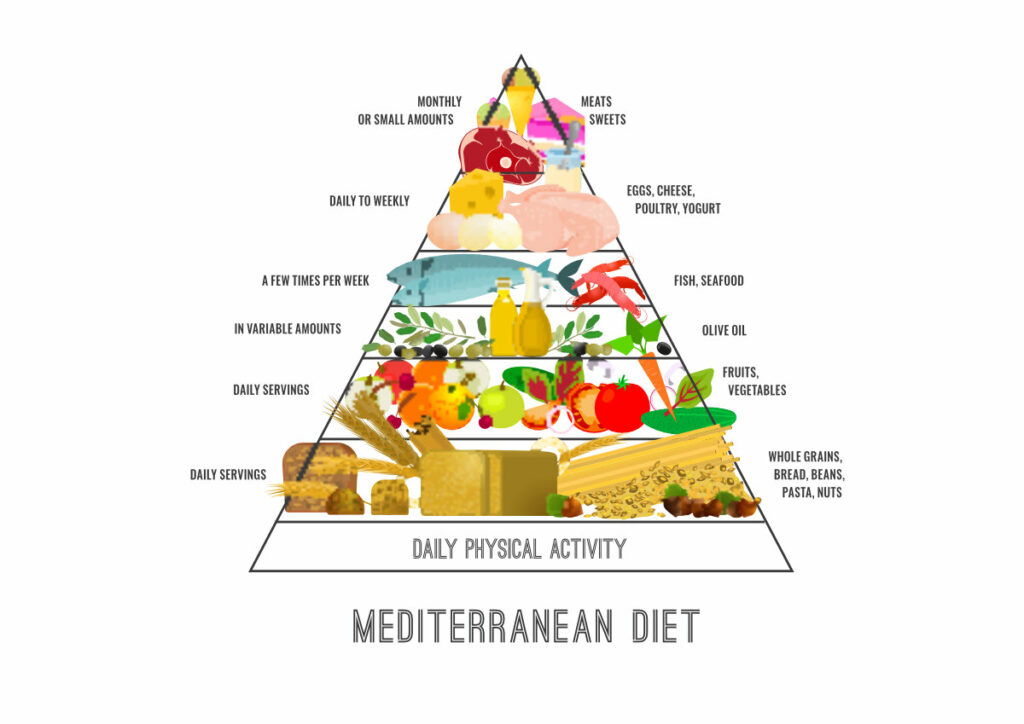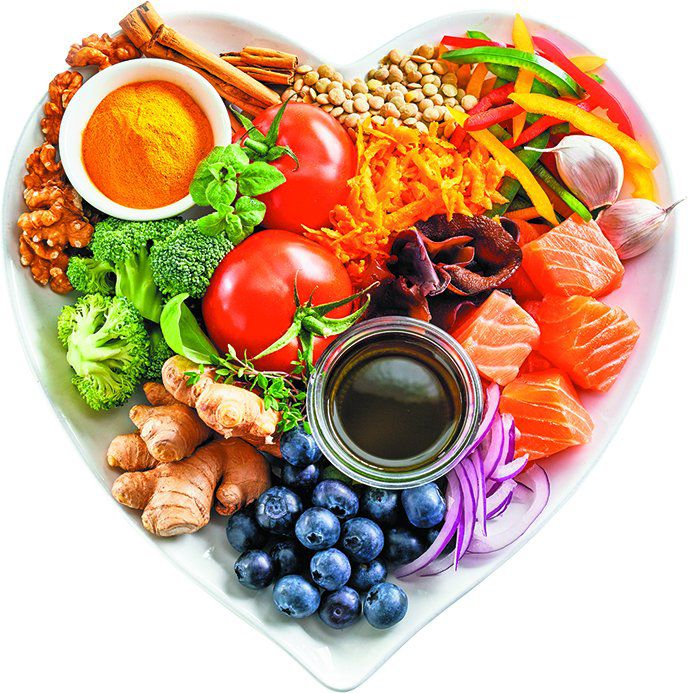Healthy Patterns

Healthy dietary patterns typically include high amounts of plant foods such as fruits, vegetables, whole grains, nuts, and legumes, and lower amounts of refined grains, added sugars, sodium, and red and processed meats.
Some common, good-for-you legumes include:
Chickpeas, also called garbanzo bean
Peanuts
Black beans
Green peas
Lima beans
Kidney beans
Black-eyed peas
Navy beans
Great Northern beans
Pinto beans
Soybeans
Lentils
Whole grains:
Brown Rice
Oats
Quinoa
Food with refined grains include:
White Rice
Pastries
Cake
Crackers
Some processed meats include:
Ham
Sausage
Hot dogs
Pepperoni
Beef jerky
Deli meats, including roast beef and turkey
It is important to balance caloric intake with physical activity to maintain a healthy weight.
Foods that contribute to heart disease and their healthier alternatives:
Fatty meats: These meats contain high amounts of saturated fat and are therefore considered not in line with general cardiac diets due to concerns of elevating undesirable LDL blood cholesterol, a risk factor for heart disease. Frying meats at high temperatures changes the form of fats found in the frying oil, making them more damaging to our bodies. Fried foods are also often breaded, making them more problematic. If choosing meats, opt for leaner cuts such as: white meat chicken or turkey without skin, fish and seafood, beef – 95% lean or greater ground beef, sirloin tip, bottom round, eye of round, top round; Pork- tenderloin, top loin chop or roast. Stick to baking broiling, steaming, stewing, grilling, and roasting. Avoid frying.
Heavy or greasy foods: These foods are typically high in calories (energy), sodium, saturated fats, and sometimes refined carbohydrates. Eating more calories (energy from food) than you burn causes weight gain, and being overweight increases the load on the heart. Saturated fats are not considered in-line with general cardiac diets due to concerns of elevating LDL (undesirable) blood cholesterol, a risk factor for heart disease. Excessive sodium in the diet can increase blood pressure levels and fluid retention. Refined carbohydrates cause a rapid and excessive rise in blood sugar (they are “high glycemic”). Elevated blood contributes to the formation of heart disease. Eat more: fresh foods that you must prepare yourself; vegetables; fruit – especially berries.
Salty foods: Excessive sodium in the diet can increase blood pressure levels and fluid retention. With the exception of cured meats, and deli meats such as turkey and ham, this category of food is also usually high in refined carbohydrates which cause a rapid and excessive rise in blood sugar (they are “high glycemic”). Elevated blood sugar (glucose) contributes to the formation of heart disease. Eat less of these foods: processed foods – usually come in boxes, bags, and cans; cured food, preserved food. Eat more: fresh foods that you must prepare yourself; vegetables; fruit – especially berries.
Sweets: Sweets are high in added sugar and sometimes highly processed vegetable oils. Sugar causes a rapid and excessive rise in blood sugar (it is “high glycemic”). Elevated blood sugar contributes to formation of heart disease. Too much sugar in the diet can also cause fatty liver. Processed vegetable oils can raise levels of inflammation in the body, and excess inflammation is not good for the heart. Replace with: dark chocolate (70% or greater) in moderation – a small square or 2 is a moderate amount to have in a day; fresh foods that you must prepare yourself; vegetables; fruit – especially berries.
Soda: Due to the sugar content, they cause a rapid and excessive rise in blood sugar (glucose). Elevated blood sugar is a risk factor for heart disease. The particular type of sugar in soda makes it even worse for you. If you have trouble eliminating soda, consider trying Zevia, a type of soda sweetened with Stevia (a natural sweetener that does not contain calories of affect blood sugar). It is available at Rouse’s, Drug Emporium, Whole Foods, and Sandra’s Health Food Store. You can also squeeze citrus fruit into carbonated water to get that fizzy sensation with a bit of sweetness.
Refined/High glycemic carbohydrates: Refined carbohydrates cause a rapid and excessive rise in blood sugar (they are “high glycemic”). Elevated blood sugar contributes to the formation of heart disease. Carbohydrates that are actually good for your heart are natural, fiber rich sources, such as vegetables, fruits – especially berries, beans (not baked/BBQ beans), and whole grains (brown rice, oatmeal (not sweetened with sugar), etc.
– Jordan Smith RD
